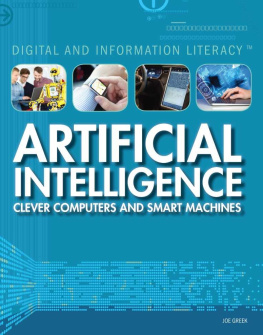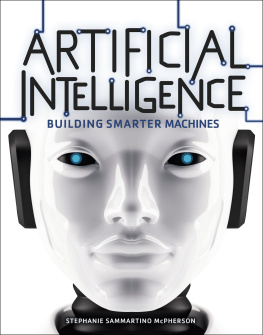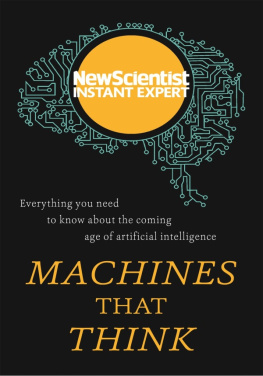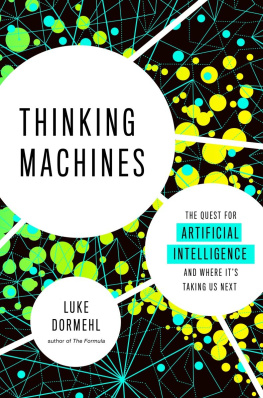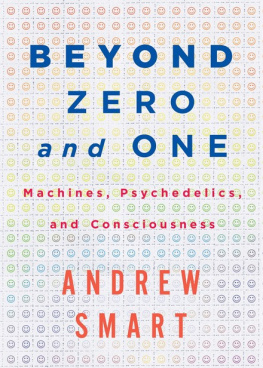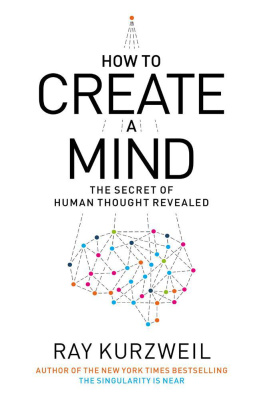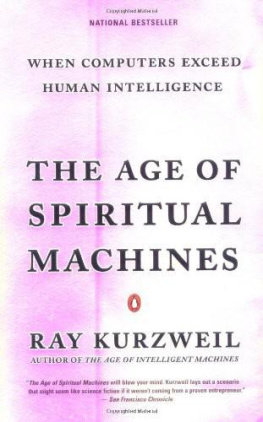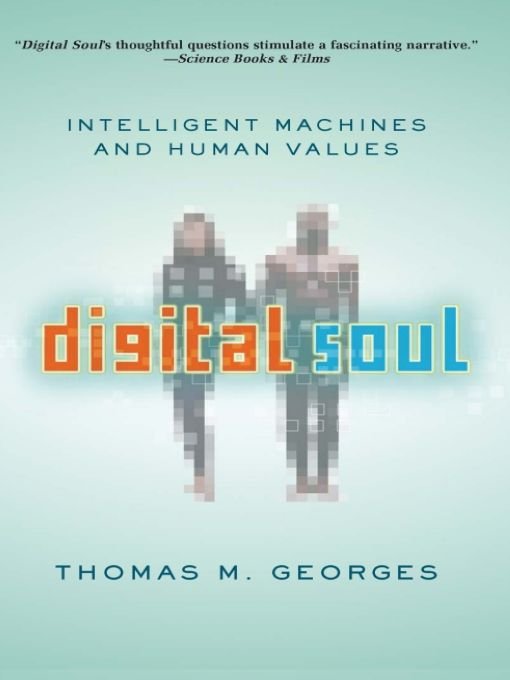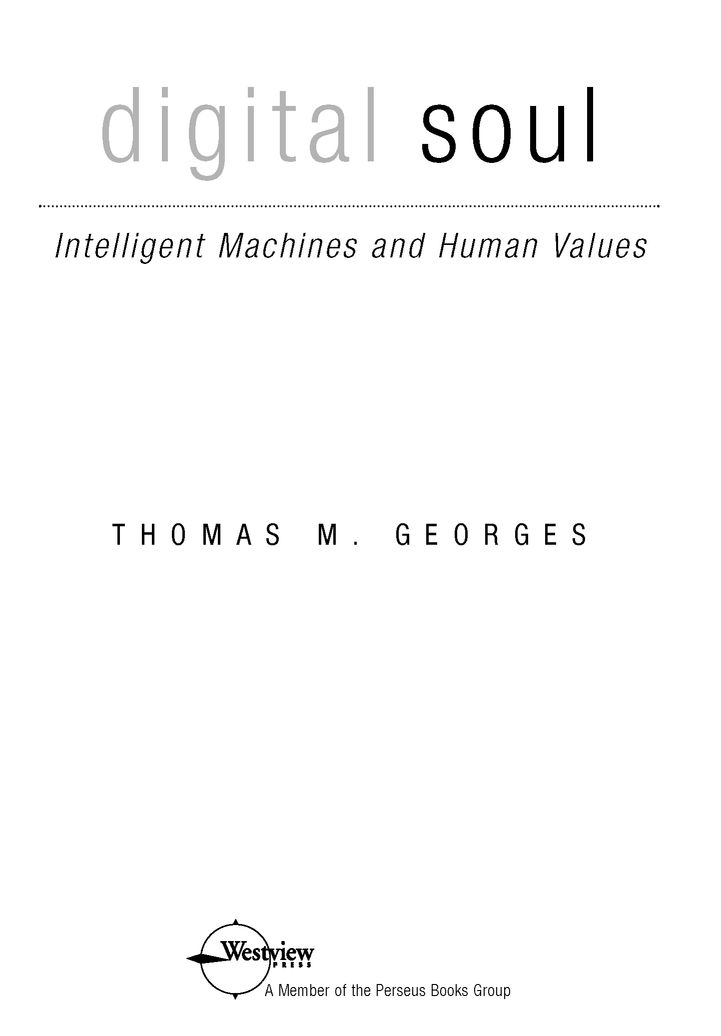Table of Contents
preface
Most people have a short list of books that they discovered at pivotal points in their life and that changed the way they think in crucial ways. In a sense, this book began in the 1960s, when I picked up a copy of Dean Wooldridges book The Machinery of the Brain. This idea was both amazing and disturbing to me because it upset a lifetime of Catholic doctrine about an immortal soul and the spiritual nature of the human mind. In place of mysticism, it offered the possibility that the whole of human experience is not only understandable but reproducible. Could it possibly be true? I had to find out more.
My curiosity led me to books such as Huston Smiths The Religions of Man, B. F. Skinners Beyond Freedom and Dignity, Edward O. Wilsons On Human Nature, Pamela McCorducks Machines Who Think, Douglas Hofstadters Gdel, Escher, Bach, and Robert Wrights Moral Animal as well as the 1988 Public Broadcasting Service series Joseph Campbell and the Power of Myth.
I found out that the idea of man as a mechanism is an ancient one, but that this idea has been eclipsed by mystical and spiritual views of man promoted by the worlds religions. I learned that science is discovering that the most complex human behaviors, including ethical and moral reasoning, are rooted in basic biological imperatives and that brain research is revealing more and more mental functions, like emotions and consciousness, as the workings of a wonderfully complex information processor.
Adding to the evidence for physical explanations of intelligent behavior are the great strides that have been made since the 1950s toward developing machines with artificial intelligence, or AI. As a result, machines that can learn are taking over more and more functions that we have always assumed to be uniquely human, such as playing championship chess. Given the present rate of growth of computing power, some scientists seriously predict that machines will become more intelligent and aware than we are in just thirty to forty yearsoutperforming humans in every important way, and perhaps even forming a global brain!
What are we to make of all this? Although we are still far from creating an artificial human being, it might be wise to start thinking about how the future intelligent machines could change the way we see ourselves and even alter humankinds future. A world populated with intelligent artifacts that have minds and feelings of their own raises many tricky questions, such as these:
How would humans react on discovering that the club of sentient beings is not as exclusive as they thought?
How would that knowledge change our moral and ethical values?
How would it affect our notions of freedom and dignity?
How would it affect our beliefs in God?
Can computers be conscious?
Can they have emotions?
If so, what are their rights and responsibilities?
If we make something that is indistinguishable from a person, should we treat it like one?
Should we be worried that superintelligent machines will somehow take over the world?
Are intelligent machines the next step in evolution?
Will humans and machines somehow merge?
Will humans become extinct? Or immortal?
And most important... How much control do we have over the process?
This book is not for experts in computers or artificial intelligence. My audience is ordinary people who are curious enough to ask questions like these, and who want to be able to make informed decisions about the course of AIs development. It is even for those who think that all this is rubbishthat no matter how smart machines get, they will never truly think, have a soul, or be self-aware in the same sense we are. Whatever your leanings, it should do no harm to explore, poke around, ask questions, and try to find out what makes machines so smart, what their inherent limitations might be, and where the boundary between human and artificial intelligence might lie. If these questions make you vaguely uncomfortable, it may be because they challenge the very foundations of all our social, legal, and religious institutions.
Because there are already lots of books about the mechanics of AI, as well as works of fiction and nonfiction that speculate about future worlds inhabited by thinking machines, it is reasonable to ask what new territory I hope to cover here. We will explore an unfamiliar land along the boundary between science and human values. There, we will seek out the logical structure of human feelings, consciousness, and morality that would make it possible for machines to possess them as well. Then we will delve into the social, moral, ethical, and religious consequences of creating thinking and feeling artifacts.
What sort of consequences? As any science-fiction fan knows, the big problem with intelligent machines, going back as far as Frankenstein , is loss of control. The public probably had its first taste of the moral and ethical aspects of computer behavior in Stanley Kubricks 1968 movie 2001: A Space Odyssey. The HAL 9000 computer in charge of running the Discovery spaceship suddenly turned on its crew, murdering all but one. This sort of psychotic behavior should come as no surprise when machines designed to be our servants become so complex that we can no longer understand how they work. If we put them in charge of critical aspects of our lives, then what is to stop them from taking over completely and pursuing goals that we can barely comprehend? And if they did so, how would superintelligent machines ultimately regard lowly humans? Would they even stoop to communicate with us?
How could we avoid such a grim future? Only by knowing what our choices are and by carefully thinking about the kind of future we want to live in can we hope to influence the science and technology policies that will take us there.
I wish to thank my friends and colleagues who let me pester them with my strange questions and who shared their insights with me. I also thank those who read the manuscript and made valuable suggestions, particularly my wife, Julianne Cassady; Bob and Janet Evans; Jay Palmer; Patricia Boyd; and Marilynn Breithart.
Artificial IntelligenceThats the Fake Kind, Right?
Pay no attention to that man behind the curtain!
THE WIZARD OF OZ
Just about everyone has an opinion about the prospects of creating artificial intelligence and artificial life. These opinions range from Are you crazy? to Why not? Many regard the idea as blasphemous and accuse scientists of playing God. Others confine it to the realm of science fictionentertaining but not to be taken seriously. Still others think it can be done but question whether it should be done. Most people believe that there is something intangible or spiritual about the way that minds work that can never be captured in silicon circuitry. The very term artificial intelligence suggests that machine intelligence will always fall short of real intelligence. Whatever your beliefs, you probably hold them with religious conviction. The mere mention of machines that are conscious, have feelings, or could have rights usually generates such heat and emotion as to preclude rational debate.


